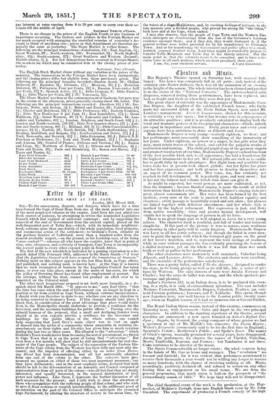Trttrr to trMot.
ANOTHER SHOT AT THE CAPE.
London, 28th March 1851.
Snt—To the annoyances, disgusts, and dangers, which have for a time transformed the Cape of Good Hope from one of the most peaceful into one of the most perplexed colonies in the empire, Lord Grey has just added two fresh sources of jealousy, by attempting to revive the nominated Legislative Council which had expired of universal contempt ; and by suggesting the removal of the seat of Government from the ancient capital, placed on the well-frequented port of Table Bay—which, with its immediate neighbour- hoed, contains more than one-fourth of the whole population, fixed property, and Commercial action of the settlement—to Graham's Town, situated on the perilous frontier of Caffreland, more than a hundred miles from the nearest available seaport,—on the ground, as his Lordship says, of its being "more central !"—whereas all who know the country, know that in point of time, ease, cheapness, and certainty of transport, Cape Town is incomparably the nearest point to every other exposed point in South Africa. The first of the new mischiefs is indicated by a passing expression in a de- vetch dated 17th February 1851, addressed to Sir Harry Smith—"I trust that the Legislative Council will have resumed the transaction of business." Nothing more on this subject appears in the last Blue Book on Cape affairs, just published, and nothing more is known here : at the Cape it is known that no such resumption of business by the Legislative Council has taken place, or ever can take place, except in the midst of bayonets, for which the policy of Downing Street has found other employment at present. But the attempt, without the deed, cannot but produce an effect ever to be lamented on the Colonial mind.
The other most inopportune proposal is set forth more formally, in a de- spatch dated 5th March 1851. "It appears to me," says Earl Grey, "that the time has come when the seat of Government can no longer be kept in a position so far from central as Cape Town, without extreme inconvenience. 1 should wish you therefore to state to me, whether you see any objection to its being removed to Graham's Town. If this change should take place, I think that, in consideration of the great advantage that place would derive from it, the Municipality should undertake to provide a residence for the Governor, and the necessary buildings for public offices." Passing over the subacid humour of the proposal, that a small and declining frontier town should at its own expense provide a residence for the Governor and buildings for the public offices of the whole colony, one cannot help suspecting that Lord Grey's main object was to cast an apple of discord into the midst of a community whose unanimity in resisting en- croachments on their rights and liberties has given him so much vexation during the last two or three years. His allusion to the "advantage " which Graham's Town would derive from becoming the seat of government, is a threat to Cape Town that it is on the point of loeing that " advantage." But even here a few months will show that he still misunderstands the real cha- racter of the Cape people. The subject of the separation of the Eastern Dis- tricts of the Cape colony from the Western has been fullyand most ably dis- cussed; and the impolicy of effecting either by an order from Down- ing Street has been demonstrated, and all but universally admitted from one end of the colony to the other. The colonists have pro- nounced no opinion on either of these two most important measures.; but they have deliberately, and in the most emphatic terms, declared that both should be left to the determination of an Assembly and Council composed of representatives from all parts of the colony—who all feel that they are deeply interested, and equally interested, in the natural distribution of local power and influence. Like them, I deprecate the further discussion of all such measures for the present; and I only wish to draw the attention of those who sympathize with the suffering people of that colony, and who wish to save it from reckless or waspish intermeddling, to the additional proof of an intention on the part of the Colonial Office to anticipate the promised Cape Parliament, by altering the structure of society in the mean time, by the voices of a shasntBegislattire, and, by exciting feelingsof jealousy' to ob- tain mastery over a divided people, who proved too strong for "the Office," both here and-at the Cape, when united. I may also observe, that the people of Cape Town and the Western- Dis- tricts anticipate no disadvantage from the loss of the Governor's habitual residence amongst them ; and if they did, they would disregard it, if the general welfare were better provided for by his transference to Graham's, Town. And as for transferring the Government and public offices to a small, isolated, exposed frontier town, Lord Grey might as reasonably propose to transfer Table Mountain and Table Bay to the thirsty interior. But the main point is, that the colonists desire to be consulted, and to have a de- cisive voice in all such matters, which are most peculiarly their own.


























 Previous page
Previous page